
Mathis James Reed was an American blues musician and songwriter. His particular style of electric blues was popular with a wide variety of audiences. Reed's songs such as "Honest I Do" (1957), "Baby What You Want Me to Do" (1960), "Big Boss Man" (1961), and "Bright Lights, Big City" (1961) appeared on both Billboard magazine's R&B and Hot 100 singles charts.

Bobby Rush is an American blues musician, composer, and singer. His style incorporates elements of blues, rap, and funk.

James Milton Campbell Jr., better known as Little Milton, was an American blues singer and guitarist, best known for his number-one R&B single "We're Gonna Make It". His other hits include "Baby, I Love You", "Who's Cheating Who?", and "Grits Ain't Groceries ".
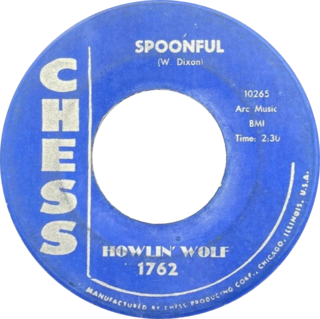
"Spoonful" is a blues song written by Willie Dixon and first recorded in 1960 by Howlin' Wolf. Called "a stark and haunting work", it is one of Dixon's best known and most interpreted songs. Etta James and Harvey Fuqua had a pop and R&B record chart hit with their duet cover of "Spoonful" in 1961, and it was popularized in the late 1960s by the British rock group Cream.
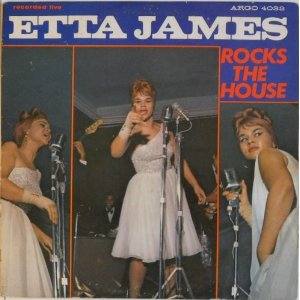
Etta James Rocks the House is the first live album by the American singer Etta James. It was recorded live on the nights of September 27 and 28, 1963, at the New Era Club in Nashville, Tennessee, and was released on December 13, 1963.
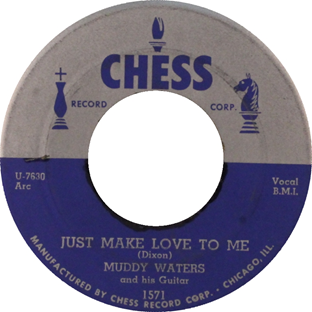
"I Just Want to Make Love to You" is a blues song written by Willie Dixon. In 1954, it was recorded by Muddy Waters, and released as a single with the title "Just Make Love to Me". The song reached number four on Billboard magazine's R&B Best Sellers chart.

"Trouble No More" is an upbeat blues song first recorded by Muddy Waters in 1955. It is a variation on "Someday Baby Blues", recorded by Sleepy John Estes in 1935. The Allman Brothers Band recorded both studio and live versions of the song in the late 1960s and 1970s.

Nothin' But the Blues is an album by Elkie Brooks.
"Big Boss Man" is a blues song first recorded by Jimmy Reed in 1960. It became one of his most popular songs, although the songwriting is credited to Luther Dixon and Al Smith. Chicago-based Vee-Jay Records released it as a single, which became one of Reed's last appearances on the record charts. The song has been recorded by artists in diverse styles, including Elvis Presley, B.B. King, and Hope Sandoval, who also had chart successes with the song.
"I'd Rather Go Blind" is a blues song written by Ellington Jordan with co-writing credits to Billy Foster and Etta James. It was first recorded by Etta James in 1967, released the same year, and has subsequently become regarded as a blues and soul classic.
"(Sweet Sweet Baby) Since You've Been Gone" is a song by singer Aretha Franklin. Released from her Lady Soul album in 1968, the song was successful, debuting at number 31 and peaking at number 5 on the Hot 100 for five weeks, and spending three weeks at number 1 on the Hot Rhythm & Blues Singles chart. The B-side, "Ain't No Way", was also a hit, peaking at number 16 on the Billboard Hot 100 and number 9 on the Hot Rhythm & Blues Singles chart.
"Bright Lights, Big City" is a classic blues song which was written and first recorded by American bluesman Jimmy Reed in 1961. Besides being "an integral part of the standard blues repertoire", "Bright Lights, Big City" has appealed to a variety of artists, including country and rock musicians, who have recorded their interpretations of the song.

Henry Bernard Glover was an American songwriter, arranger, record producer and trumpet player. In the music industry of the time, Glover was one of the most successful and influential black executives. He gained eminence in the late 1940s, primarily working for the independent King label. His duties included operating as a producer, arranger, songwriter, engineer, trumpet player, talent scout, A&R man, studio constructor, while later in his career he became the owner of his own label. Glover worked with country, blues, R&B, pop, rock, and jazz musicians, and he helped King Records to become one of the largest independent labels of its time. Thanks to the efforts of family, friends and fans, Glover's hometown of Hot Springs, Arkansas celebrated the 100th anniversary of his birth in 2021 by inducting him into the downtown "Walk of Fame," the Mayor's "Proclamation," "Key to the City," and named a parklet "Henry Glover Way," along Black Broadway after him. In 2018, Glover was recognized with a Lifetime Achievement Award by the King Records 75th Anniversary. In 2013, he was inducted into the Blues Hall of Fame.

"Baby What You Want Me to Do" is a blues song that was written and recorded by Jimmy Reed in 1959. It was a record chart hit for Reed and, as with several of his songs, it has appeal across popular music genres, with numerous recordings by a variety of musical artists.
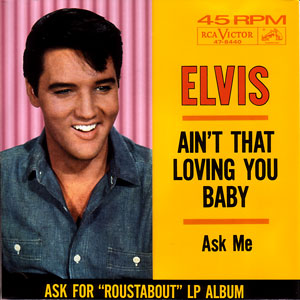
"Ain't That Loving You, Baby" is a song written by Clyde Otis and Ivory Joe Hunter and originally recorded by Eddie Riff in 1956. Elvis Presley recorded the song in 1958 and released the song as a single in 1964.

The Youngbloods is the debut self-titled studio album by the American rock band the Youngbloods, released in 1967. It was also reissued in 1971 under the title Get Together after the popular single from the album. The album peaked at number 131 on the Billboard 200 although two years later the single "Get Together" reached number five and sold more than a million copies.
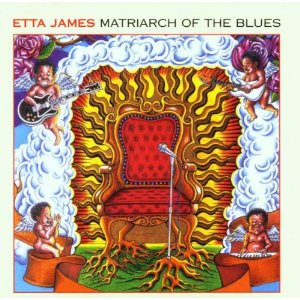
Matriarch of the Blues is the twenty-fourth studio album by Etta James, released in December 2000 through the record label Private Music. The album's title reflects James' nickname as "matriarch of the blues". Marking James' return to blues following attempts at country music and jazz and pop standards, the album consists primarily of rhythm and blues covers. James' sons, Donto and Sametto, are credited as engineers, mixers, and producers, among other contributions; the album features Mike Finnigan on the Hammond organ, guitarist Leo Nocentelli, and performances on multiple instruments by Jimmy Zavala.
Lefty Bates was an American Chicago blues guitarist. He led the Lefty Bates Combo and worked with the El Dorados, the Flamingos, Jimmy Reed, John Lee Hooker, Buddy Guy, Etta James, the Aristo-Kats, the Hi-De-Ho Boys, the Moroccos, and the Impressions. A regular on the Chicago blues scene, his major work was as a session musician on numerous recordings in the 1950s and 1960s.

One Night in America is the twenty first studio album by American blues singer and harmonica player Charlie Musselwhite. It was released in February 2002 on Telarc record label and it was Musselwhite's debut and only release on this label.

I'm Jimmy Reed is an album by blues musician Jimmy Reed, compiling twelve tracks originally issued as singles between 1953 and 1958, that was released by the Vee-Jay label.














